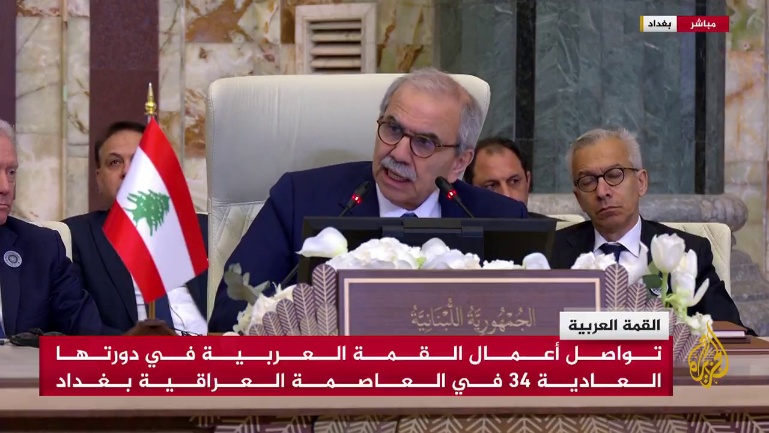Overview
IDF forces continued operations targeting Hezbollah’s presence in south Lebanon, which is in violation of the ceasefire, preventing the organization from rebuilding its military capabilities. The forces eliminated Hezbollah terrorist field commanders and operatives in south Lebanon.
Hezbollah secretary general Na’im Qassem called on Lebanese state institutions to increase pressure on Israel against its “ongoing aggression and violations.” He also admitted that Iran had served the “resistance”[1] and that they had benefited from it in every respect.
Lebanese leaders claimed that American-led international pressure should compel Israel to withdraw from south Lebanon and halt its attacks in the country.
Lebanese President Aoun said Hezbollah had to understand it had no choice but to accept the concept of the state’s monopoly on weapons, but added that it had to be achieved through dialogue and not hastily, to avoid confrontation.
The United States is reportedly pressuring the Lebanese government to shut down Hezbollah’s financial arm, the al-Qard al-Hassan Association. A sum of $21 million has reportedly disappeared from the association’s activity, and there are concerns it was transferred to Hezbollah’s military wing.
An indictment was filed against a person affiliated with Hezbollah accused of collaborating with Israel by providing information enabling Israel to target senior Hezbollah terrorists during and after the war.
Lebanon is preparing for a visit by Palestinian Authority chairman Mahmoud Abbas, who is expected to discuss the disarmament of armed Palestinian “factions” in the refugee camps. President Aoun questioned whether Palestinian arms were truly meant “to liberate Palestine” or to kill Palestinians and Lebanese.
The Ceasefire
The IDF in Lebanon
The IDF continued to operate against Hezbollah targets in south Lebanon which were operating in violation of the ceasefire agreement of November 27, 2024, which prohibits the organization’s presence south of the Litani River. Hezbollah’s efforts to rebuild its military-terrorist capabilities were also attacked. The IDF announced that two Hezbollah commanders and three operatives were eliminated in south Lebanon, some of whom were involved in efforts to rebuild the organization’s military capabilities (IDF spokesperson, May 12–19, 2025). The Lebanese ministry of health reported four fatalities in the IDF attacks in south Lebanon (al-Nashra, May 12–19, 2025).
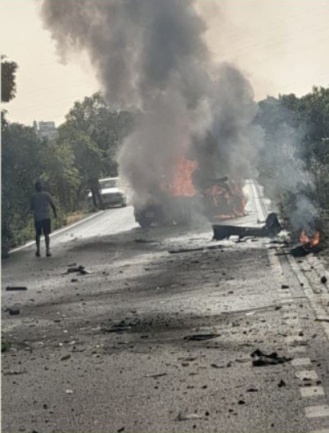
Attack on a Hezbollah field commander in the al-Zrariyeh area, deep in south Lebanon
(Lebanese News Agency, May 17, 2025)
Hezbollah
Hezbollah secretary general Na’im Qassem again accused Israel of committing more than 3,000 “violations” of the ceasefire agreement, while claiming the “resistance” had honored its commitments and enabled the Lebanese army to deploy south of the Litani River. He said the organization would deal with the situation “with all possible forms of confrontation appropriate to the current stage.” He called on the Lebanese state to increase pressure and take action to end the “violations” and said the three most important issues on the national agenda were halting “Israeli aggression and violations,” rebuilding the state and economic and social development (al-Manar, May 12, 2025).
Ali Fayyad, member of the Hezbollah faction in the Lebanese Parliament, said the path to stability and recovery in Lebanon began with exerting pressure on Israel to withdraw from the five points, cease “hostile acts,” release Lebanese prisoners held in Israel, respect Lebanese sovereignty and remove obstacles to reconstruction. He also said it was the state’s duty to protect the Lebanese people (al-Nashra, May 19, 2025).
The Lebanese leadership
Lebanese President Joseph Aoun claimed the Israeli presence in the five points in south Lebanon prevented the Lebanese army from completing its deployment south of the Litani River, after the army had already cleared 85–90% of the area, adding that Lebanon had proposed Israel withdraw its forces gradually. He said Lebanon was in contact with the United States, France, Egypt, Jordan and the UAE, but only the United States could pressure Israel, and they were expecting a visit from Deputy Special Envoy to the Middle East Morgan Ortagus. Aoun said normalization with Israel was not on the agenda, but they were interested in indirect talks under United States’ auspices to determine the land border between the two countries, similar to the maritime border negotiations (YouTube channel of the program “The Last Word” with Lamees al-Hadidi, ON TV, May 18, 2025).
Nabih Berri, speaker of the Lebanese Parliament, said the only way to stop Israel’s daily attacks was to appeal to the Americans, with whom Lebanon signed the ceasefire agreement, and they should enforce its implementation on Israel (Asas Media, May 17, 2025). In another interview, Berri said that Lebanon was waiting for the committee overseeing the implementation of the ceasefire agreement to fulfill its promise to stop the “Israeli violations.” When asked about a response to continued attacks, he said, “Our decision now is to be patient, and we will remain patient” (al-Joumhouria, May 16, 2025).
Lebanese Prime Minister Nawaf Salam met with Patrick Gauchat, the chief of staff of the UN ceasefire monitoring organization, and discussed the general situation and security developments in south Lebanon (al-Nashra, May 16, 2025).
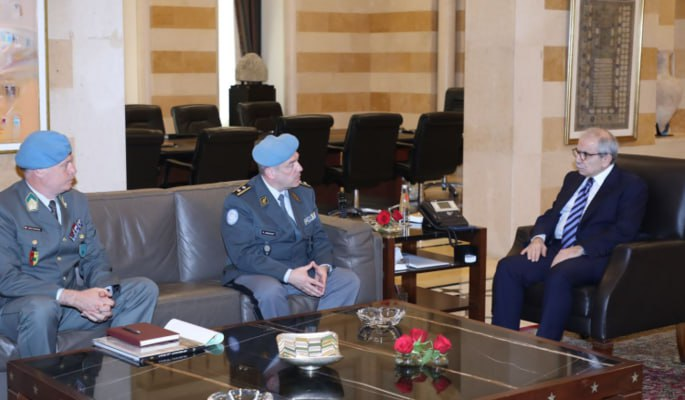
Salam and Gauchat (al-Nashra, May 16, 2025)
Lebanese Prime Minister Nawaf Salam said in his speech at the Arab League Summit in Baghdad that Lebanon was working to implement UN Security Council Resolution 1701. He claimed the country was suffering from the “Israeli occupation” with daily violations of its sovereignty and Israel’s refusal to release Lebanese prisoners. He called on participants to pressure the international community to force Israel to stop its attacks and to immediately withdraw completely from Lebanese territory (al-Nashra, May 17, 2025).
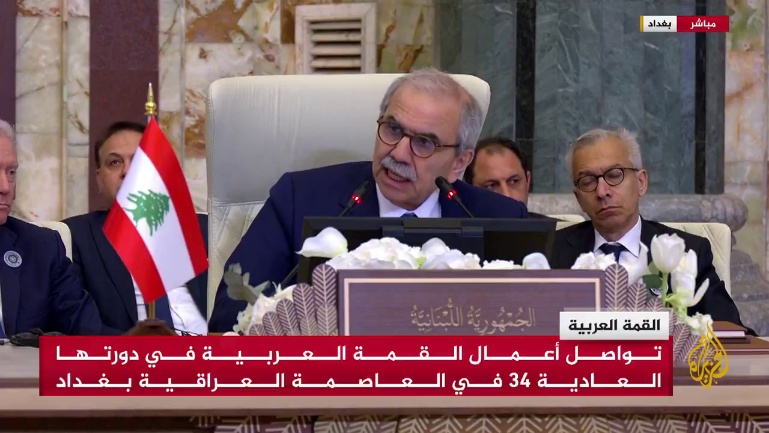
Salam gives a speech at the Arab League Summit in Baghdad (al-Jazeera, May 17, 2025)
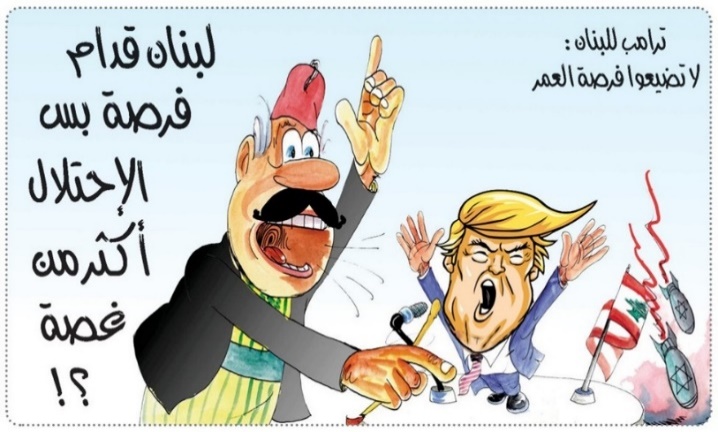
Trump to the Lebanese: “Don’t miss the opportunity of your lives.” A Lebanese responds, “Lebanon may have an opportunity, but the occupation brings it more pain,” pointing to Israeli bombings in Lebanon (al-Liwaa, May 15, 2025)
The Lebanese army
The Lebanese army and ministry of health reported that a soldier and a civilian were wounded in an Israeli attack on a commercial vehicle near the Beit Yahoun–Bint Jbeil road in south Lebanon (X account of the Lebanese Army and al-Nashra, May 18, 2025).
UNIFIL
UNIFIL reported that since the ceasefire began in late November 2024, it had helped the Lebanese army redeploy to more than 120 permanent positions south of the Litani River, although full deployment still faced obstacles due to the presence of IDF forces in Lebanese territory. UNIFIL forces have located more than 225 weapons depots, which were handed over to the Lebanese army. According to the statement, over 10,000 UNIFIL soldiers from more than 50 countries were operating in south Lebanon to monitor the situation and report violations of Resolution 1701, in close coordination with the Lebanese army (UNIFIL Telegram channel, May 13, 2025).
UNIFIL expressed concern over the IDF’s “hostility” toward the force and its property near the Blue Line, claiming that two shots were fired from south of the Blue Line, one of which struck a UNIFIL base, in addition to four incidents of IDF fire near UNIFIL posts along the Blue Line. UNIFIL claimed its personnel had witnessed “other hostile IDF behavior” towards troops engaged in activity in accordance with Resolution 1701. UNIFIL protested the actions and called on all parties to ensure the safety and security of UN personnel and property (al-Nashra, May 14, 2025).
Residents of the town of al-Jmaijmeh in south Lebanon clashed with a UNIFIL force which allegedly tried to enter private land. Local residents reportedly prevented the force’s entry because it did not have a Lebanese army escort and UNIFIL troops fired into the air and used tear gas. The incident ended when Lebanese soldiers intervened and calmed the situation (al-Nashra, May 16, 2025). UNIFIL claimed that a group of “aggressive” people tried to block the force’s activity, using metal rods and axes to damage UN vehicles. UNIFIL called on Lebanese authorities to ensure that its forces could carry out their duties without threats or interference (UNIFIL Telegram channel, May 16, 2025).
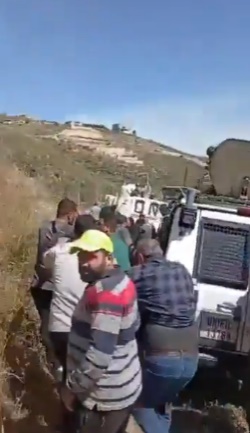
Local residents near a UNIFIL vehicle (X account of al-Madan, May 16, 2025)
Disarming Hezbollah
Hezbollah
A “source close to Hezbollah” claimed the organization was cooperating with President Joseph Aoun’s efforts to disarm it and had proposed ideas for its heavy and advanced weapons. According to the source, Hezbollah understood that the circumstances that enabled its armament were no longer relevant and was prepared to think in terms of the future regarding its weapons. The source added that the dialogue with President Aoun would continue no date had been set (al-Hadath, May 16, 2025).
The Lebanese government
In his January 2025 inaugural speech, Lebanese President Joseph Aoun said the need to guarantee the state’s monopoly on weapons was not a populist slogan, but a goal to be implemented through dialogue to avoid confrontation. He acknowledged international pressure to resolve the issue quickly but said that the discussion should not be limited to a fixed timetable or rushed. He said messages were being exchanged because “Hezbollah’s security situation prevented meetings.” He said they were focusing on weapons located south of the Litani River, although any weapons depot discovered north of the river was handled swiftly. Aoun added that Hezbollah had the right to participate in political life as it represented a political sector, but that weapons could only be in the hands of the state. Hezbollah, he said, had no choice but to accept the concept of state authority and understand that the state protected it and would be responsible in the event of a confrontation with Israel. Regarding threats made by Hezbollah secretary general Na’im Qassem against anyone who “tried to touch” the group’s weapons, Aoun said the remarks might have been aimed at Hezbollah’s support base (YouTube channel of the program “The Last Word” with Lamees al-Hadidi, ON TV, May 18, 2025). During his visit to Kuwait, Aoun discussed the issue of the state monopoly on arms, stating that the only right was to achieve the goal was through dialogue, and the matter had to be handled carefully and slowly in order to preserve civilian safety (al-Nashra, May 12, 2025).
Speaking at the Arab League summit in Baghdad, Lebanese Prime Minister Nawaf Salam said his country had turned over a new leaf in its history by adopting a progressive policy of reforms in various fields and establishing state sovereignty over all its territory, while limiting the use of arms to the state. He said that the decision of peace or war lay exclusively with the state (al-Nashra, May 17, 2025).
Assessments in Lebanon suggest that the internal-Lebanese dialogue regarding Hezbollah’s weapons will wait for the outcome of negotiations between the United States and Iran on a new nuclear agreement. “Sources familiar with behind-the-scenes political and diplomatic discussions” said that if there was an agreement between Washington and Tehran, it would have consequences on more than one arena shared by the two sides, one of which was Lebanon. According to the sources, the issue of Hezbollah’s weapons would be dealt with through dialogue according to President Aoun’s initiative (al-Joumhouria, May 17, 2025).
President Aoun reportedly decided to confront the hawks in the government demanding the immediate and total disarmament of Hezbollah. The most prominent example was Foreign Minister Youssef Rajji, who has repeatedly said that Hezbollah and the militias had to be disarmed, even by force if necessary. In response, Lebanese Army Commander Rodolph Haykal and General Security Chief Hassan Shaqir appealed to Rajji and presented him with the security risks and the need to avoid bloodshed or loss of control (Asas Media, May 14, 2025).
Hezbollah
In a speech marking the first anniversary of the death of former Iranian President Ebrahim Raisi, Hezbollah secretary general Na’im Qassem said Hezbollah was proud to be at the forefront of the “resistance”[2] with “Palestine,” Lebanon, Iran, and all “honorable resistance fighters in the region.” He claimed the “resistance” in Lebanon did not serve the “Iranian project” in the region, but rather that Iran served the “resistance project,” from which they benefited through economic, social, military and cultural aid (Hezbollah combat information Telegram channel, May 18, 2025).
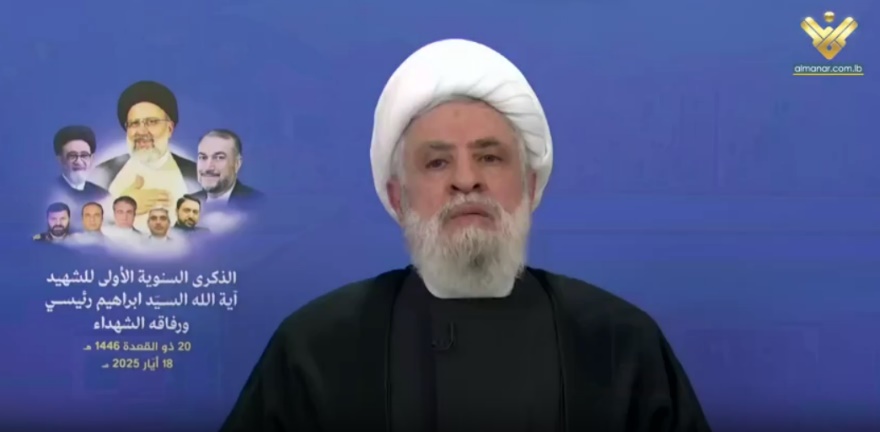
Na’im Qassem speaking in memory of the Iranian president (al-’Ahed, May 18, 2025)
Financial pressure on Hezbollah
“Senior Lebanese government officials” conveyed to Hezbollah that there was growing pressure from the American administration to shut down the al-Qard al-Hassan Association, Hezbollah’s financial arm, considered one of the organization’s key funding sources. Hezbollah warned that any action against the financial institution would lead to an “explosion” with the Lebanese government and to destabilization. Hezbollah claimed it hoped the positive atmosphere surrounding the talks about the future of its weapons would also apply to al-Qard al-Hassan and that no measures would be taken beyond the current understandings. The organization emphasized that it was open to discussing any proposal on the matter, as long as it “did not provoke its supporters” (al-Akhbar, May 15, 2025).
Meanwhile, “senior Lebanese diplomatic sources” reported that the United States Embassy in Beirut’s anti-money laundering and financial crimes unit, which operates in coordination with Lebanese governmental and banking groups, had received information on the disappearance of $21 million from al-Qard al-Hassan’s economic activity between February and April 2025. According to the sources, the investigation showed that the funds had not been used for the association’s standard activities, such as community assistance, loan accounts or administrative purposes like establishing new branches. The sources indicated suspicions that the money had gone to Hezbollah’s military wing, which was facing a financial crisis due to increased monitoring measures at Beirut airport. The sources added that the funds were moved through commercial transactions or money transfers by individuals with Lebanese citizenship residing in European countries or by non-Lebanese nationals in countries like Russia, various European states and Arab nations (Aram News, May 16, 2025).
The United States Department of the Treasury imposed sanctions on two senior Hezbollah operatives, Mu’in Daqiq al-’Amali (based in Iran) and Hassan Abdallah Ni’mah, and on two financial aides, Jihad Alami and Fadi Ni’mah, for their involvement in coordinating foreign donation transfers to Hezbollah. Al-’Amali reportedly transferred cash to Hezbollah operatives working directly with the office of former secretary general Hassan Nasrallah, including Alami, who distributed the funds. Following Hamas’ October 7, 2023 attack and massacre and early in 2024, al-Amali coordinated a transfer of at least $50,000 collected from Iran to Alami, which was believed to be intended for the Gaza Strip (United States Department of the Treasury, May 15, 2025).
Alleged Mossad Agent Exposed in Hezbollah
The government commissioner of the military tribunal, Judge Fadi Aqiqi, filed an indictment against Muhammad Hadi Saleh, a resident of the Dahiyeh al-Janoubia[3] in Beirut who sang in religious choirs at Hezbollah events, for collaborating with Israel and in exchange for $23,000, providing information that led to the deaths of “civilians.” Saleh was summoned for questioning following a complaint of fraud regarding his work in the stock market, but a search of his phone revealed alleged communications with “Israeli agents” starting at the outbreak of fighting between Hezbollah and Israel in October 2023 (al-Madan, May 14, 2025). A “security source” reported that the Israelis contacted Saleh after they hacked his phone and discovered he was in debt (Beirut Time, May 2025).
A “legal source” stated that Saleh provided Israeli intelligence with highly detailed information, including coordinates, about the movements of senior Hezbollah figures and operatives, due to his proximity to them and their children. As a result, many senior figures in Hezbollah were eliminated. The most recent activity attributed to Saleh was providing information that led to the targeting of Hezbollah’s Palestinian file manager, Hassan Badir, and his son Ali, who were killed in an Israeli Air Force attack on their home in the Dahiyeh al-Janoubia on April 29, 2025. According to the source, Saleh was considered “the most dangerous agent” captured since the war began (al-Sharq al-Awsat, May 16, 2025).
The investigation reportedly revealed that Saleh gave Israel the names of commanders appointed to replace those killed, photographed them and sent the photos to his Israeli handlers. Social media posts included photos of Saleh with Hezbollah members killed in the war, with captions such as “Congratulations, my dear,” “My brother and beloved, you are a source of pride,” “Maybe I’ll see you again,” and “May Allah help you, my friend” (al-Janoubiya, May 15, 2025). “Sources close to security authorities” said Saleh also passed on sensitive intelligence, some related to Hezbollah’s elite Radwan Force. He reportedly admitted to receiving “dead drop” emails from the Mossad containing instructions for picking up cash from various locations (al-Jadeed, May 17, 2025).
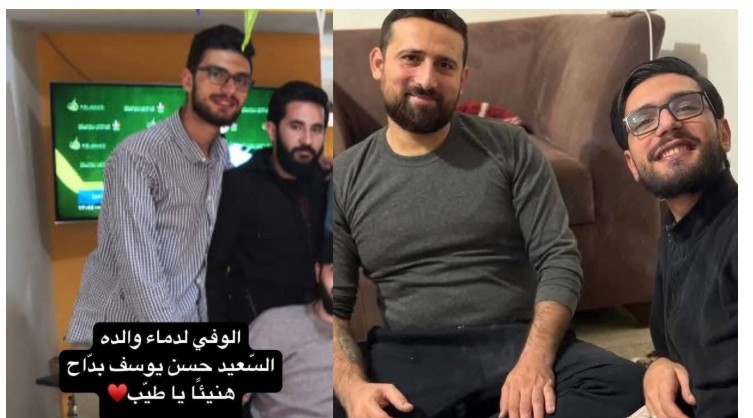
Mohammad Hadi Saleh (wearing glasses) in photos with Hezbollah operatives killed by Israel
(al-Janoubiya, May 16, 2025)
Saleh’s family denied the allegations, claiming he went into debt two years ago due to his involvement in the stock market, was physically attacked over his inability to repay the debt and was then handed over to security services. They said, “The group demanding money from him was the same group that slandered him and accused him of being an agent” (al-Madan, May 15, 2025).
The arrest reportedly shocked Hezbollah’s inner circle because of the extent of Mossad infiltration, as Saleh was the son of a senior Radwan Force operative and his brother was killed in fighting against Israel. A “legal source” said incidence of collaboration with Israel had snowballed since the ceasefire began, and following Saleh’s arrest, there were now 21 individuals charged with collaboration: 13 Lebanese, six Syrians and two Palestinians (al-Sharq al-Awsat, May 16, 2025). Hezbollah was reportedly reviewing events from the war to identify possible security failures which could have enabled infiltration (Spot Shot channel, May 15, 2025).
In response to Saleh’s arrest, a gallows was erected on al-Shura Street in the Dahiyeh al-Janoubia. Photos on social media showed signs demanding the execution of agents who spied for Israel (al-Janoubia, May 16, 2025). Ali al-Amin, editor of al-Janoubia and a known Hezbollah critic, said the wave of collaborators exposed the extent of Hezbollah’s vulnerability. He added that the gallows was meant to indicate that collaboration with Israel was the exception, not the norm within the organization (al-Sharq al-Awsat, May 16, 2025).
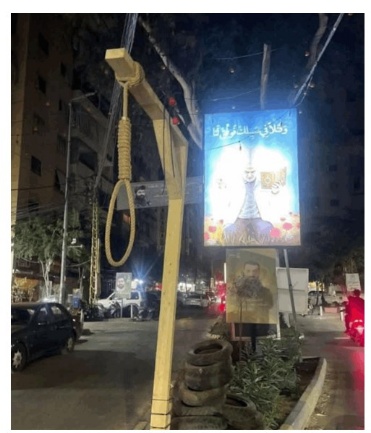
Gallows erected in the Dahiyeh al-Janoubia (al-Janoubia, May 16, 2025)
Municipal elections in Lebanon
Hezbollah’s representative in the Beqa’a region, Hussein al-Nimr, announced that the Development and Loyalty lists, shared by Hezbollah and Amal, had won overwhelming victories in 28 of 80 municipalities in the elections held in the Beqa’a Valley and Baalbek-Hermel on June 18, 2025, in the third round of municipal elections. He said all candidates on the list in the city of Baalbek had won by a margin of about 6,000 votes. He described it as a “complete victory” and said the Beqa’a Valley region had proved it was part of the “resistance” and could be relied upon. He claimed the rival list sought political change rather than regional development, but the residents voted at the ballot box. Al-Hajj Hassan, member of the Hezbollah faction in the Lebanese Parliament, said the “resistance environment” once again demonstrated its presence and resilience, and that the elections showcased the strength of the “Shi’ite duo” [Hezbollah and Amal] alliance (al-Manar, May 19, 2025).
Shiite criticism of the Lebanese government
Deputy head of the Supreme Shi’ite Council, Sheikh Ahmed al-Khatib, accused the state of neglecting its citizens regarding protection from Israel and the reconstruction of destroyed areas. According to al-Khatib, the government was negligent, deprived the Shi’ite community of aid and restricted travel from Iraq, Turkey and Iran to Lebanon. He accused the government of demanding disarmament, seeking assistance from the new Syrian government and confronting the Shi’ite community, effectively pushing the country toward a new civil war. In contrast, he praised President Joseph Aoun for rejecting the use of force to disarm Hezbollah while simultaneously calling for an end to the “occupation” and supporting dialogue. Al-Khatib added that the Shi’ite community in Lebanon demanded state protection and attention for the south. He claimed it was an opportunity to stand behind the president and build a “real,” united country which would defend Lebanon and remove the existential threat hanging over it (Sidon website, May 16, 2025).
Mufti Ahmed Qabalan said that the top national priority had to be reconstruction. He claimed some parties wanted residents of the south, the Beqa’a Valley and the Dahiyeh al-Janoubia to remain under the rubble as part of an international scheme to punish the “resistance.” He warned that such a situation was catastrophic and said a state that betrayed the south, the Dahiyeh and the Beqa’a Valley was not a real state, adding, “Don’t push us into a corner.” Qabalan called normalization of relations with Israel] a betrayal of Jerusalem, “Palestine” and the causes of Arabs and Muslims, and Lebanon should not normalize relations with Israel (al-Nashra, May 16, 2025).
Lebanon
Lebanese Prime Minister Nawaf Salam conducted a surprise inspection of Beirut International Airport, where he received a briefing on measures to ensure aviation safety. Salam met with the airport’s security chief and other officials to review efforts to enhance security and streamline passenger entry and exit, contributing to improved transportation and reduced waiting times (X account of the Lebanese Prime Minister, May 13, 2025). The visit followed reports that dozens of airport employees had been dismissed due to suspected ties with Hezbollah, part of the government’s efforts to prevent arms smuggling to the organization.
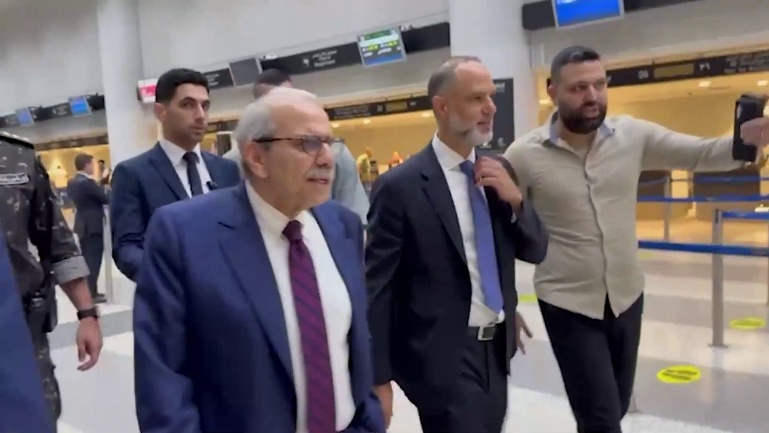
)Surprise inspection by Salam at the airport
(X account of the Lebanese Prime Minister, May 13, 2025
The Lebanese army
Lebanese Army Commander Rodolph Haykal met at his office with the Iranian Ambassador to Lebanon, Mojtaba Amani, to discuss the general situation in Lebanon and the region (X account of the Lebanese army, May 15, 2025).
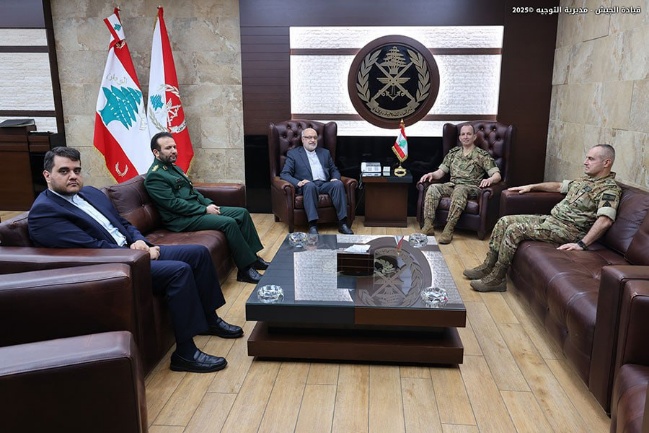
The Lebanese army commander meets with the Iranian ambassador to Lebanon
(X account of the Lebanese army, May 15, 2025)
Palestinians in Lebanon
Lebanese President Joseph Aoun said he was waiting for the upcoming visit of Palestinian Authority chairman Mahmoud Abbas to Beirut to discuss the issue of the weapons in the Palestinian refugee camps and how they should be organized to preserve security and stability (Lebanon Debate, May 18, 2025). In another interview, he questioned whether the weapons held by Palestinian “factions”[4] were truly meant “to liberate Palestine” or whether most were used for fighting among Palestinians themselves or between Palestinians and Lebanese. He added that both the Lebanese and Palestinians were tired of the issue and that he was waiting for Mahmoud Abbas’ visit to address it. He said the priority was to deal with the heavy weapons in the camps (YouTube channel of the program “The Last Word” with Lamees al-Hadidi, ON TV, May 18, 2025).
“Sources in the Fatah movement” said Mahmoud Abbas had sent his son, Yasser Abbas, to coordinate the visit to Lebanon, which was expected to take place on May 21, 2025. Abbas reportedly met with several security officials and informed them that his father planned to raise the issue of Palestinian weapons inside and outside the camps, and that he sought to resolve it as part of a package deal which would include both the weapons and granting civil rights to refugees. However, “sources in Hamas” said that the issue of the refugee camps would not be resolved at the push of a button between Mahmoud Abbas and the Lebanese state, and that a Palestinian internal dialogue would be needed first to establish a strategy for disarmament and to find alternatives within the camps, ranging from community policing to civil rights. “Security sources” also reported that senior Palestinian officials had received warnings from Lebanese security agencies about assassination threats. One of those warned was the head of the Islamic Jihad,[5] Sheikh Jamal Khattab, who plays a role in mediating and calming tensions between Fatah and the Islamist movements on one side and extremist groups on the other (al-Akhbar, May 15, 2025).
An article by journalist Abdallah Qamah cast doubt on the feasibility of Mahmoud Abbas’ plan to disarm armed Palestinian “militias” in Lebanon. He said that while the Palestinian Authority was the legitimate representative of the Palestinians, it did not have actual security control over most of the refugee camps and had oversight only over a few “militias.” Moreover, he warned that raising the issue of weapons was meant to improve the Palestinian Authority’s image in the international arena, alongside its bid to assume responsibility for the Gaza Strip. Qamah recommended that the Lebanese authorities proceed cautiously and define conditions for future cooperation on disarmament, the first of which should be Palestinian internal consensus before any Lebanese action on the ground (Lebanon Debate, May 14, 2025).
[1] Hezbollah and the Palestinian terrorist organizations operating in Lebanon.
[2] Iran, Hezbollah, the Palestinian organizations operating in Lebanon, the Gaza Strip, Judea and Samaria, and the Houthis in Yemen whose objective is to destroy and eliminate the State of Israel.
[3] Hezbollah’s Shi’ite stronghold in the southern suburb of Beirut.
[4] Terrorist organizations.
[5] The Islamic Jihad Movement is a Palestinian Islamist movement based in the Ain al-Hilweh refugee camp in Sidon. It is not the Palestinian Islamic Jihad (PIJ).
Related Articles
